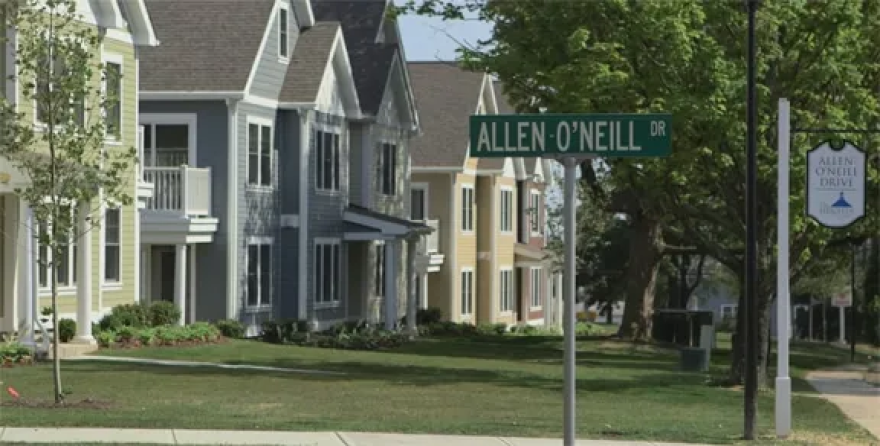Republican gubernatorial candidate Bob Stefanowski on Thursday repeated his calls to repeal one of the state’s tools to encourage affordable housing development, citing a need for more local control.
“I’ll start by saying this is not a partisan strategy. This is not against affordable housing. And I feel very strongly that we need to do a better job in Connecticut of providing it. This is more about a bill, referred to as 8-30g, that simply hasn’t worked,” Stefanowski said at the press conference in Fairfield.
He added that the state should work with towns to encourage affordable housing.
Stefanowski this week tweeted a video of himself talking about his experience growing up in North Haven in a two-bedroom home with a walk-in closet as a bedroom.
“I’m a product of affordable housing, and I genuinely care about — I know what it’s like to be trapped in a city,” he said Thursday.
The decades-old law offers court remedies to developers who are denied permission to build affordable housing so that they can build despite local zoning ordinances. Towns are exempt from the law if at least 10% of their housing stock is designated affordable.
Stefanowski pointed to the fact that few towns have met that 10% threshold as evidence that the law doesn’t work.
Developers, state officials and housing experts have said restrictive local zoning ordinances make it difficult to build multi-family housing in Connecticut.
Sean Ghio, policy director at the Partnership for Strong Communities, said that the law was intended to be a part of the overall strategy to increase affordable housing and that it succeeded in providing thousands more units.
“Has it succeeded in supplying enough affordable housing for the state of Connecticut? No. It was never intended to do that,” Ghio said.
“Yet again, Stefanowski showed up without a serious proposal,” said Lamont campaign spokeswoman Onotse Omoyeni. "The man who admitted he has no idea how to address the housing crisis hardly stacks up to Gov. Lamont, who’s invested nearly $500 million to help build new affordable housing units."
“Connecticut deserves a wide variety of housing to meet the needs of its diverse population," Omoyendi continued. "Gov. Lamont knows the best decisions are made at the local level and has worked with officials to increase housing across the state. At the ballot box this November, voters will choose a leader who delivers results for our families over a flailing candidate who has no realistic plan to help the people of our state.”
Housing experts have referred to 8-30g as an important tool to developing more affordable housing in a state that lacks tens of thousands of rental units that its lowest-income residents can afford. Housing is typically considered affordable if people are spending up to a third of their income on housing costs.
Stefanowski said if elected, he wanted his administration to sit down with towns to learn more about the issues they face and determine whether they are trying to meet the affordable housing need.
He pointed to efforts in Fairfield to create a housing trust fund. The town has a little less than 3% of its unit designated affordable, according to 2021 data.
Stefanowski provided few details about how it would be determined if towns were trying and who would make that determination.
“Some towns may just come out and say 'We're not going to do it,' and I think if that's the case, you’ve got to have a tougher discussion,” he said.
Asked whether incentivizing towns meant increased investment in agencies such as the Department of Housing or the Connecticut Housing Finance Authority, he pointed again to a need for local control.
Both agencies have programs in place to incentivize towns and developers to create more affordable housing.
“I would focus on local control,” he said, referencing the Fairfield housing trust fund. “I mean the fund that [Fairfield First Selectwoman] Brenda [Kupchick] has set up here. Maybe we can provide some money to assist in those funds.”
The affordable housing law has faced criticism from lawmakers and local officials, particularly in Fairfield County, who say it erodes local control.
Rep. Laura Devlin, a Fairfield Republican and Stefanowski’s running mate, testified last session on a bill that proposed a study of 8-30g. Advocates said the bill was a veiled attack on the law, and many who supported the study spoke against 8-30g.
“What 8-30g has done is create a path for incredible wealth-building among developers, as they are able to circumvent local zoning and exploit the statue for their own financial gain,” Devlin said in written testimony during the legislative session.
The bill did not make it out of committee.
Kupchick said in an interview that 8-30g allows developers to increase density regardless of the needs of the town.
“Fairfield County is the only one really under siege,” she said.
Since 8-30g became law more than 30 years ago, Fairfield has considered 23 affordable housing development projects. Ten of those have been in the past two years, according to the town’s website.
Ghio said that the court remedy is likely to be used largely in towns where developers believe the economy can support additional development and places where more people want to move such as Fairfield County.
Kupchik also said that the law would require the town to build thousands more units of housing. But 8-30g includes state-backed mortgages and housing choice vouchers, neither of which require more development.
"We need to get back to local control," Stefanowski said, referring to 8-30g. "And we need to incent towns to build affordable housing. The stick approach that Gov. Lamont has tried to us is not working."
Wake up with CT Mirror's free daily news summary.
Wake up with CT Mirror's free daily news summary.

